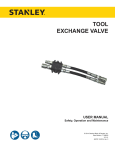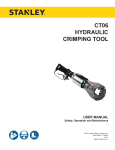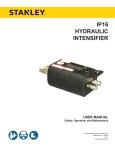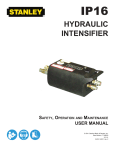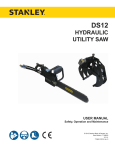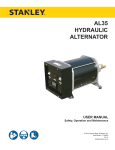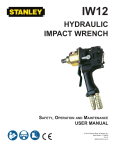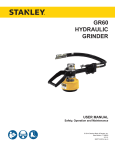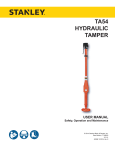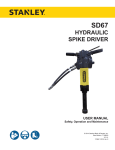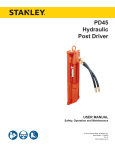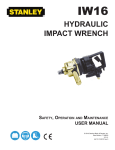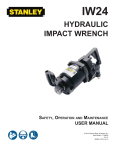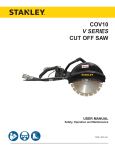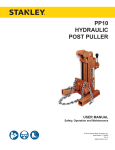Download RV06 User Manual - Stanley Hydraulic Tools
Transcript
RV06 HYDRAULIC ROCKER VALVE USER MANUAL Safety, Operation and Maintenance © 2014 Stanley Black & Decker, Inc. New Britain, CT 06053 U.S.A. 24056 9/2014 Ver. 3 TABLE OF CONTENTS SAFETY SYMBOLS...................................................................................................................................................4 SAFETY PRECAUTIONS...........................................................................................................................................5 TOOL STICKERS & TAGS.........................................................................................................................................6 HOSE TYPES.............................................................................................................................................................7 HOSE RECOMMENDATIONS...................................................................................................................................8 FIGURE 1. TYPICAL HOSE CONNECTIONS........................................................................................................8 HTMA REQUIREMENTS............................................................................................................................................9 OPERATION.............................................................................................................................................................10 FIGURE 2. CONNECTING THE RV06 TO A DOUBLE-ACTING TOOL............................................................... 10 FIGURE 3. CONNECTING THE RV06 TO A SINGLE-ACTING TOOL................................................................. 10 TOOL PROTECTION & CARE.................................................................................................................................12 TROUBLESHOOTING.............................................................................................................................................13 SPECIFICATIONS....................................................................................................................................................14 HYDRAULIC SYSTEM REQUIREMENTS...............................................................................................................14 RV06 PARTS ILLUSTRATION.................................................................................................................................15 RV06 PARTS LIST...................................................................................................................................................16 IMPORTANT To fill out a Product Warranty Validation form, and for information on your warranty, visit Stanleyhydraulics.com and select the Company tab, Warranty. (NOTE: The warranty Validation record must be submitted to validate the warranty). SERVICING: This manual contains safety, operation, and routine maintenance instructions. Stanley Hydraulic Tools recommends that servicing of hydraulic tools, other than routine maintenance, must be performed by an authorized and certified dealer. Please read the following warning. WARNING SERIOUS INJURY OR DEATH COULD RESULT FROM THE IMPROPER REPAIR OR SERVICE OF THIS TOOL. REPAIRS AND / OR SERVICE TO THIS TOOL MUST ONLY BE DONE BY AN AUTHORIZED AND CERTIFIED DEALER. For the nearest authorized and certified dealer, call Stanley Hydraulic Tools at the number listed on the back of this manual and ask for a Customer Service Representative. RV06 User Manual ◄ 3 SAFETY SYMBOLS Safety symbols and signal words, as shown below, are used to emphasize all operator, maintenance and repair actions which, if not strictly followed, could result in a life-threatening situation, bodily injury or damage to equipment. This is the safety alert symbol. It is used to alert you to potential personal injury hazards. Obey all safety messages that follow this symbol to avoid possible injury or death. DANGER This safety alert and signal word indicate an imminently hazardous situation which, if not avoided, will result in death or serious injury. WARNING This safety alert and signal word indicate a potentially hazardous situation which, if not avoided, could result in death or serious injury. CAUTION This safety alert and signal word indicate a potentially hazardous situation which, if not avoided, could result in death or serious injury. CAUTION This signal word indicates a potentially hazardous situation which, if not avoided, may result in property damage. NOTICE This signal word indicates a situation which, if not avoided, will result in damage to the equipment. IMPORTANT This signal word indicates a situation which, if not avoided, may result in damage to the equipment. Always observe safety symbols. They are included for your safety and for the protection of the tool. LOCAL SAFETY REGULATIONS Enter any local safety regulations here. Keep these instructions in an area accessible to the operator and maintenance personnel. 4 ► RV06 User Manual SAFETY PRECAUTIONS Tool operators and maintenance personnel must always comply with the safety precautions given in this manual, and on the stickers and tags attached to or on the tool and hose(s). These safety precautions are for your safety. Review them carefully before operating the tool or performing any maintenance or repairs. • Damaged fittings, connectors, quick couplers, and hoses may fail at or below their rated working pressure, resulting in serious injury or death. • Do not attempt to locate hydraulic leaks by feeling around hoses and fittings with bare hands OR gloved hands. Pin-hole leaks can penetrate the skin (oil injection). To inspect for leaks, de-pressurize the system (rocker valve, intensified, and power source), clean around the suspected area, pressurize the system and visually inspect for leaks. If possible, the above procedure should be performed behind some type of shield (Lexan®). • Do not operate the tool at fluid temperatures above 140 °F/60 °C. Operation at higher temperatures can cause higher than normal temperatures at the tool, which can result in operator discomfort. • To avoid personal injury or equipment damage, all tool maintenance, repair, and service must be performed by properly trained personnel. Supervising personnel may specify additional precautions for your work area to comply with company policies and local safety regulations. Enter any added precautions in the space provided in this manual. The RV06 Rocker Valve will provide safe, dependable service if operated in accordance with the instructions given in this manual. Read and understand the manual any decals, labels, or tags attached to the tool and hose(s). Failure to do so can cause serious personal injury or damage to the equipment. • Operator must start in a work area without bystanders. The operator must be familiar with all prohibited work areas such as excessive slopes and dangerous terrain conditions. • Establish a training program for all operators to ensure safe operation of the tool. • Do not operate the tool unless thoroughly trained or under the supervision of the instructor. • Always wear personal protection equipment (PPE) such as goggles, safety shoes, head, eye, breathing, and ear protection when operating the tool. Use gloves and aprons when necessary. • All fittings, connectors, quick couplers, and hoses used in the high pressure circuit must be capable of 10,000 psi/690 bar operation. • All fittings, connectors, quick couplers, and hoses must be leak-tight and free of cracks, dents and other damage. • Do not operate the tool if it is damaged, improperly adjusted, or incompletely assembled. • Use only hydraulic hoses labeled and certified nonconductive when using the rocker valve/intensifier on or near electric lines. • Do not use tightly coiled or twisted hoses. • Hoses should not be kinked, cut, swollen or heavily abraded at any point along their entire length. RV06 User Manual ◄ 5 TOOL STICKERS & TAGS DANGER Failure to use hydraulic hose labeled and certified as non-conductive when using hydraulic tools on or near electric lines may result in death or serious injury. For proper and safe operation read owners manual and mwke sure that you have been properly ELECTROCUTION HAZARD trained in correct procedures required for work on or around electric lines. 12412 Electrical Warning Sticker 05153 Stanley Sticker NOTE: THE INFORMATION LISTED ON THE STICKERS SHOWN, MUST BE LEGIBLE AT ALL TIMES. REPLACE DECALS IF THEY BECOME WORN OR DAMAGED. REPLACEMENTS ARE AVAILABLE FROM YOUR LOCAL STANLEY DISTRIBUTOR. The safety tag (P/N 15875) at right is attached to the tool when shipped from the factory. Read and understand the safety instructions listed on this tag before removal. We suggest you retain this tag and attach it to the tool when not in use. D A N G E R 1. FAILURE TO USE HYDRAULIC HOSE LABELED AND CERTIFIED AS NON-CONDUCTIVE WHEN USING HYDRAULIC TOOLS ON OR NEAR ELECTRICAL LINES MAY RESULT IN DEATH OR SERIOUS INJURY. BEFORE USING HOSE LABELED AND CERTIFIED AS NONCONDUCTIVE ON OR NEAR ELECTRIC LINES BE SURE THE HOSE IS MAINTAINED AS NON-CONDUCTIVE. THE HOSE SHOULD BE REGULARLY TESTED FOR ELECTRIC CURRENT LEAKAGE IN ACCORDANCE WITH YOUR SAFETY DEPARTMENT INSTRUCTIONS. 2. A HYDRAULIC LEAK OR BURST MAY CAUSE OIL INJECTION INTO THE BODY OR CAUSE OTHER SEVERE PERSONAL INJURY. A. DO NOT EXCEED SPECIFIED FLOW AND PRESSURE FOR THIS TOOL. EXCESS FLOW OR PRESSURE MAY CAUSE A LEAK OR BURST. B. DO NOT EXCEED RATED WORKING PRESSURE OF HYDRAULIC HOSE USED WITH THIS TOOL. EXCESS PRESSURE MAY CAUSE A LEAK OR BURST. C. CHECK TOOL HOSE COUPLERS AND CONNECTORS DAILY FOR LEAKS. DO NOT FEEL FOR LEAKS WITH YOUR HANDS. CONTACT WITH A LEAK MAY RESULT IN SEVERE PERSONAL INJURY. D A N G E R D. DO NOT LIFT OR CARRY TOOL BY THE HOSES. DO NOT ABUSE HOSE. DO NOT USE KINKED, TORN OR DAMAGED HOSE. 3. MAKE SURE HYDRAULIC HOSES ARE PROPERLY CONNECTED TO THE TOOL BEFORE PRESSURING SYSTEM. SYSTEM PRESSURE HOSE MUST ALWAYS BE CONNECTED TO TOOL “IN” PORT. SYSTEM RETURN HOSE MUST ALWAYS BE CONNECTED TO TOOL “OUT” PORT. REVERSING CONNECTIONS MAY CAUSE REVERSE TOOL OPERATION WHICH CAN RESULT IN SEVERE PERSONAL INJURY. 4. DO NOT CONNECT OPEN-CENTER TOOLS TO CLOSEDCENTER HYDRAULIC SYSTEMS. THIS MAY RESULT IN LOSS OF OTHER HYDRAULIC FUNCTIONS POWERED BY THE SAME SYSTEM AND/OR SEVERE PERSONAL INJURY. 5. BYSTANDERS MAY BE INJURED IN YOUR WORK AREA. KEEP BYSTANDERS CLEAR OF YOUR WORK AREA. 6. WEAR HEARING, EYE, FOOT, HAND AND HEAD PROTECTION. 7. TO AVOID PERSONAL INJURY OR EQUIPMENT DAMAGE, ALL TOOL REPAIR MAINTENANCE AND SERVICE MUST ONLY BE PERFORMED BY AUTHORIZED AND PROPERLY TRAINED PERSONNEL. I M P O R T A N T I M P O R T A N T READ OPERATION MANUAL AND SAFETY INSTRUCTIONS FOR THIS TOOL BEFORE USING IT. READ OPERATION MANUAL AND SAFETY INSTRUCTIONS FOR THIS TOOL BEFORE USING IT. USE ONLY PARTS AND REPAIR PROCEDURES APPROVED BY STANLEY AND DESCRIBED IN THE OPERATION MANUAL. USE ONLY PARTS AND REPAIR PROCEDURES APPROVED BY STANLEY AND DESCRIBED IN THE OPERATION MANUAL. TAG TO BE REMOVED ONLY BY TOOL OPERATOR. TAG TO BE REMOVED ONLY BY TOOL OPERATOR. SEE OTHER SIDE SEE OTHER SIDE SAFETY TAG P/N 15875 (Shown smaller then actual size) 6 ► RV06 User Manual HOSE TYPES The rated working pressure of the hydraulic hose must be equal to or higher than the relief valve setting on the hydraulic system. There are three types of hydraulic hose that meet this requirement and are authorized for use with Stanley Hydraulic Tools. They are: Certified non-conductive — constructed of thermoplastic or synthetic rubber inner tube, synthetic fiber braid reinforcement, and weather resistant thermoplastic or synthetic rubber cover. Hose labeled certified nonconductive is the only hose authorized for use near electrical conductors. Wire-braided (conductive) — constructed of synthetic rubber inner tube, single or double wire braid reinforcement, and weather resistant synthetic rubber cover. This hose is conductive and must never be used near electrical conductors. Fabric-braided (not certified or labeled non-conductive) — constructed of thermoplastic or synthetic rubber inner tube, synthetic fiber braid reinforcement, and weather resistant thermoplastic or synthetic rubber cover. This hose is not certified non-conductive and must never be used near electrical conductors. HOSE SAFETY TAGS To help ensure your safety, the following DANGER tags are attached to all hose purchased from Stanley Hydraulic Tools. DO NOT REMOVE THESE TAGS. If the information on a tag is illegible because of wear or damage, replace the tag immediately. A new tag may be obtained from your Stanley Distributor. D A N G E R D A N G E R 1. FAILURE TO USE HYDRAULIC HOSE LABELED AND CERTIFIED AS NON-CONDUCTIVE WHEN USING HYDRAULIC TOOLS ON OR NEAR ELECTRIC LINES MAY RESULT IN DEATH OR SERIOUS INJURY. FOR PROPER AND SAFE OPERATION MAKE SURE THAT YOU HAVE BEEN PROPERLY TRAINED IN CORRECT PROCEDURES REQUIRED FOR WORK ON OR AROUND ELECTRIC LINES. 2. BEFORE USING HYDRAULIC HOSE LABELED AND CERTIFIED AS NON-CONDUCTIVE ON OR NEAR ELECTRIC LINES. WIPE THE ENTIRE LENGTH OF THE HOSE AND FITTING WITH A CLEAN DRY ABSORBENT CLOTH TO REMOVE DIRT AND MOISTURE AND TEST HOSE FOR MAXIMUM ALLOWABLE CURRENT LEAKAGE IN ACCORDANCE WITH SAFETY DEPARTMENT INSTRUCTIONS. 3. DO NOT EXCEED HOSE WORKING PRESSURE OR ABUSE HOSE. IMPROPER USE OR HANDLING OF HOSE COULD RESULT IN BURST OR OTHER HOSE FAILURE. KEEP HOSE AS FAR AWAY AS POSSIBLE FROM BODY AND DO NOT PERMIT DIRECT CONTACT DURING USE. CONTACT AT THE BURST CAN CAUSE BODILY INJECTION AND SEVERE PERSONAL INJURY. 4. HANDLE AND ROUTE HOSE CAREFULLY TO AVOID KINKING, ABRASION, CUTTING, OR CONTACT WITH HIGH TEMPERATURE SURFACES. DO NOT USE IF KINKED. DO NOT USE HOSE TO PULL OR LIFT TOOLS, POWER UNITS, ETC. 5. CHECK ENTIRE HOSE FOR CUTS CRACKS LEAKS ABRASIONS, BULGES, OR DAMAGE TO COUPLINGS IF ANY OF THESE CONDITIONS EXIST, REPLACE THE HOSE IMMEDIATELY. NEVER USE TAPE OR ANY DEVICE TO ATTEMPT TO MEND THE HOSE. 6. AFTER EACH USE STORE IN A CLEAN DRY AREA. SEE OTHER SIDE SIDE 1 SEE OTHER SIDE (Shown smaller than actual size) DO NOT REMOVE THIS TAG DO NOT REMOVE THIS TAG THE TAG SHOWN BELOW IS ATTACHED TO “CERTIFIED NON-CONDUCTIVE” HOSE SIDE 2 D A N G E R D A N G E R 1. DO NOT USE THIS HYDRAULIC HOSE ON OR NEAR ELECTRIC LINES. THIS HOSE IS NOT LABELED OR CERTIFIED AS NON-CONDUCTIVE. USING THIS HOSE ON OR NEAR ELECTRICAL LINES MAY RESULT IN DEATH OR SERIOUS INJURY. 5. CHECK ENTIRE HOSE FOR CUTS CRACKS LEAKS ABRASIONS, BULGES, OR DAMAGE TO COUPLINGS IF ANY OF THESE CONDITIONS EXIST, REPLACE THE HOSE IMMEDIATELY. NEVER USE TAPE OR ANY DEVICE TO ATTEMPT TO MEND THE HOSE. 2. FOR PROPER AND SAFE OPERATION MAKE SURE THAT YOU HAVE BEEN PROPERLY TRAINED IN CORRECT PROCEDURES REQUIRED FOR WORK ON OR AROUND ELECTRIC LINES. 6. AFTER EACH USE STORE IN A CLEAN DRY AREA. 3. DO NOT EXCEED HOSE WORKING PRESSURE OR ABUSE HOSE. IMPROPER USE OR HANDLING OF HOSE COULD RESULT IN BURST OR OTHER HOSE FAILURE. KEEP HOSE AS FAR AWAY AS POSSIBLE FROM BODY AND DO NOT PERMIT DIRECT CONTACT DURING USE. CONTACT AT THE BURST CAN CAUSE BODILY INJECTION AND SEVERE PERSONAL INJURY. 4. HANDLE AND ROUTE HOSE CAREFULLY TO AVOID KINKING, CUTTING, OR CONTACT WITH HIGH TEMPERATURE SURFACES. DO NOT USE IF KINKED. DO NOT USE HOSE TO PULL OR LIFT TOOLS, POWER UNITS, ETC. DO NOT REMOVE THIS TAG DO NOT REMOVE THIS TAG THE TAG SHOWN BELOW IS ATTACHED TO “CONDUCTIVE” HOSE. SEE OTHER SIDE SEE OTHER SIDE SIDE 1 SIDE 2 (Shown smaller than actual size) RV06 User Manual ◄ 7 8 ► RV06 User Manual All hydraulic hose must meet or exceed specifications as set forth by SAE J517. All hydraulic hose must have at least a rated minimum working pressure equal to the maximum hydraulic system relief valve setting. This chart is intended to be used for hydraulic tool applications only based on Stanley Hydraulic Tools tool operating requirements and should not be used for any other applications. The chart to the right shows recommended minimum hose diameters for various hose lengths based on gallons per minute (gpm)/ liters per minute (lpm). These recommendations are intended to keep return line pressure (back pressure) to a minimum acceptable level to ensure maximum tool performance. Tool to Hydraulic Circuit Hose Recommendations 15-34 MM Inside Diameter INCH USE (Press/Return) PSI up to 10 up to 3 3/8 10 Both 2250 49-60 13-16 FLOW >>> RETURN <<< FLOW PRESSURE 26-100 up to 25 100-200 51-100 up to 50 100-300 51-100 up to 50 26-100 up to 25 8-30 up to 8 30-60 15-30 up to 15 30-90 15-30 up to 15 7.5-30 up to 7.5 Figure 1. Typical Hose Connections 49-60 38-49 10-13 13-16 19-40 5-10.5 38-49 19-40 5-10.5 10-13 19-40 5-10.5 38-49 15-23 10-13 15-23 4-6 19 25.4 16 19 19 25.4 5/8 3/4 3/4 1 19 3/4 1 16 3/4 16 19 3/4 5/8 16 5/8 5/8 16 13 13 10 5/8 1/2 1/2 3/8 Return Pressure Return Pressure Return Pressure Return Pressure Both Return Pressure Both Both Both Both 2500 2500 2500 2500 2500 2500 2500 2500 2500 2500 2500 2500 2500 2500 2500 175 175 175 175 175 175 175 175 175 175 175 175 175 175 175 155 BAR Min. Working Pressure Certified Non-Conductive Hose - Fiber Braid - for Utility Bucket Trucks METERS Hose Lengths FEET Conductive Hose - Wire Braid or Fiber Braid -DO NOT USE NEAR ELECTRICAL CONDUCTORS 4-6 4-9 LPM Oil Flow GPM HOSE RECOMMENDATIONS HTMA / EHTMA REQUIREMENTS HTMA / EHTMA REQUIREMENTS HTMA HYDRAULIC SYSTEM REQUIREMENTS TYPE I Nominal Operating Pressure (at the power supply outlet) 4-6 gpm (15-23 lpm) 1500 psi (103 bar) TOOL TYPE TYPE II TYPE RR 7-9 gpm (26-34 lpm) 1500 psi (103 bar) 9-10.5 gpm (34-40 lpm) 1500 psi (103 bar) System relief valve setting (at the power supply outlet) 2100-2250 psi (145-155 bar) 2100-2250 psi (145-155 bar) 2200-2300 psi (152-159 bar) 2100-2250 psi (145-155 bar) Maximum back pressure (at tool end of the return hose) 250 psi (17 bar) 250 psi (17 bar) 250 psi (17 bar) 250 psi (17 bar) Measured at a max. fluid viscosity of: (at min. operating temperature) 400 ssu* 400 ssu* 400 ssu* 400 ssu* (82 centistokes) (82 centistokes) (82 centistokes) (82 centistokes) Temperature: Sufficient heat rejection capacity to limit max. fluid temperature to: (at max. expected ambient temperature) 140° F (60° C) Flow Range 140° F (60° C) 140° F (60° C) TYPE III 11-13 gpm (42-49 lpm) 1500 psi (103 bar) 140° F (60° C) 3 hp 5 hp 6 hp 7 hp Min. cooling capacity at a temperature (2.24 kW) (3.73 kW) (5.22 kW) (4.47 kW) difference of between ambient and fluid 40° F 40° F 40° F 40° F temps (22° C) (22° C) (22° C) (22° C) NOTE: Do not operate the tool at oil temperatures above 140° F (60° C). Operation at higher temperatures can cause operator discomfort at the tool. Filter Min. full-flow filtration Sized for flow of at least: (For cold temp. startup and max. dirt-holding capacity) 25 microns 30 gpm (114 lpm) Hydraulic fluid Petroleum based (premium grade, anti-wear, non-conductive) Viscosity (at min. and max. operating temps) 100-400 ssu* 25 microns 30 gpm (114 lpm) 25 microns 30 gpm (114 lpm) 100-400 ssu* 100-400 ssu* (20-82 centistokes) 25 microns 30 gpm (114 lpm) 100-400 ssu* NOTE: When choosing hydraulic fluid, the expected oil temperature extremes that will be experienced in service determine the most suitable temperature viscosity characteristics. Hydraulic fluids with a viscosity index over 140 will meet the requirements over a wide range of operating temperatures. *SSU = Saybolt Seconds Universal EHTMA HYDRAULIC SYSTEM REQUIREMENTS CLASSIFICATION B C D Nominal Operating Pressure (at the power supply outlet) 3.5-4.3 gpm (13.5-16.5 lpm) 1870 psi (129 bar) 4.7-5.8 gpm (18-22 lpm) 1500 psi (103 bar) 7.1-8.7 gpm (27-33 lpm) 1500 psi (103 bar) 9.5-11.6 gpm (36-44 lpm) 1500 psi (103 bar) 11.8-14.5 gpm (45-55 lpm) 1500 psi (103 bar) System relief valve setting (at the power supply outlet) 2495 psi (172 bar) 2000 psi (138 bar) 2000 psi (138 bar) 2000 psi (138 bar) 2000 psi (138 bar) Flow Range NOTE: These are general hydraulic system requirements. See tool specification page for tool specific requirements RV06 User Manual ◄ 9 OPERATION PREOPERATION PROCEDURES CONNECT HOSES 1. If the RV06 is to be used on or near electrical lines, both of the hoses used to connect the RV06 to the intensifier must be labeled and certified non-conductive (see Hose Recommendations). Both pressure and return hoses must be rated for a minimum working pressure of 10,000 psi/690 bar. 2. Make certain that all fittings, connectors, and quick couplers used to make connections with the RV06 and the intensifier are rated for 10,000 psi/690 bar. The RV06 is ported at both ends with a 1/4 in. female NPT ports. When using Teflon® tape as a sealant be careful not to allow the tape to enter the intensifier, RV06, or tools connected to the RV06. Contamination may disable the intensifier, RV06, or the tool. CONNECTING A DOUBLE-ACTING TOOL A double-acting tool is any tool using hydraulic power for both the advance and retract modes. Connect the advance port of the tool to the advance port (marked A) of the RV06. Connect the retract port of the tool to the retract port (marked B) of the RV06. 3. It is a good practice to connect return hoses first and disconnect them last to minimize or avoid trapped pressure within the tool or hoses. 4. Wipe all hoses and couplers with a clean, lint-free cloth before making connections. 5. Connect the hoses on the RV06 to the high-pressure outlet and return port of the intensifier. 6. Observe the marking on the end of the RV06 and the intensifier: P is the pressure inlet port of the RV06 and should be connected to the P (pressure outlet) port of the intensifier. The T (tank or return) port of the RV06 should be connected to the T port of the intensifier. 7. Tighten all connections securely. CONNECTING A TOOL TO THE RV06 The RV06 can be used to control the actuation of both single and double-acting compression and crimping tools, cutters, high-pressure lifting devices and rebar benders. Tool connection to the RV06 can be accomplished in three ways: Figure 2. Connecting the RV06 to a Double-Acting Tool A single-acting tool is any tool using hydraulic power for the advance mode and a spring for the retract modes. Single-acting tools use a single connection to the RV06. Single-acting tools connect to the RV06 in a way similar to double-acting tools. Only the advance port (marked A) of the RV06 is used to connect to the tool. The return port (marked B) is plugged with a 1/4 in. male NPT plug. 1. A combination of high-pressure (10,000 psi/690 bar) hose and couplers. 2. High-pressure (10,000 psi/690 bar) couplings only. NOTE: In order to use couplings only, it is necessary that the spacing of the pressure and return ports of a double-acting tool align exactly with the pressure and return ports of the RV06. 3. High-pressure (10,000 psi/690 bar) hose only. 10 ► RV06 User Manual Figure 3. Connecting the RV06 to a Single-Acting Tool OPERATION OPERATING PROCEDURES COLD WEATHER OPERATION • Observe all safety precautions given in this manual. • Refer to the applicable manual for the tool connected to the RV06. • Activate the parent circuit to provide power to the intensifier. Pressure will now be available at the pressure port of the RV06. If the RV06 is to be used during cold weather, preheat the hydraulic fluid at low engine speed. When using the normally recommended fluids, fluid temperature should be at or above 50 °F/10 °C (400 ssu/82 centistokes) before use. • To advance the ram of the connected tool, press the forward end of the rocker arm. • When the crimp or cut is complete, release the rocker arm and the RV06 will go to a “neutral” or “hold” position. The tool ram will remain stationary. • To retract the tool ram, press the rear of the rocker arm. If the RV06 is connected to a double-acting tool, the ram will retract under power. If the tool is single-acting, the ram will retract somewhat more slowly due to its spring return. Damage to the hydraulic system or RV06 can result from use with fluid that is too viscous or thick. RV06 User Manual ◄ 11 TOOL PROTECTION & CARE NOTICE In addition to the Safety Precautions found in this manual, observe the following for equipment protection and care. • Make sure all critical tool markings, such as labels and warning decals, are securely in place and legible. Replace any that are damaged or missing. • The rated working pressure of the hoses must be equal to (or greater than) the relief-valve setting on the hydraulic system. • Always store an idle tool in a clean dry space, safe from damage or pilferage. • Operate the tool within its rated capacity. • Do not use the tool for applications for which it was not designed. • Never connect or disconnect couplers or port connections with hydraulic pressure in the hose. • Make sure the compression tool, cutter or lifting device attached to the rocker valve is capable of operation at 10,000 psi/690 bar. • If the operating pressure of the compression tool, cutter or lifting device attached to the rocker valve is below 10,000 psi/690 bar, DO NOT USE IT. 12 ► RV06 User Manual • The intensifier used to power the rocker valve can usually be adjusted for lower operating pressures. This work should only be performed by a qualified hydraulic technician. • Always replace hoses, couplings, and other parts with replacement parts recommended by Stanley Hydraulic Tools. The hydraulic hoses to the rocker valve must have a minimum working pressure of 10,000 psi/690 bar. • All hoses must have oil resistant inner surface and an abrasion resistant outer covering. Whenever near electrical conductors, only hoses labeled and certified as non-conductive should be used. • The hydraulic circuit control valve must be in the OFF position when coupling or uncoupling the tool. Wipe all couplers clean before connecting. Use only lint-free cloths. Failure to do so may result in damage to the quick couplers and cause overheating of the hydraulic system. TROUBLESHOOTING If symptoms of poor performance develop, the following chart can be used as a guide to correct the problem. When diagnosing faults in operation of the control valve, always check that the high-pressure hydraulic power source is supplying the correct hydraulic flow and pressure to the control valve. Use a pressure gauge known to be accurate. Check the flow with the hydraulic fluid temperature at least 80 °F/27 °C. Problem Cause Not automatically returning to the NEUTRAL position. Return or tank hose from control valve to the intensifier may be restricted Solution If hose is kinked, replace it. If the hose has some obstruction in it, clear the hose or replace it. If hose coupler is obstructed, clean the coupler or replace it. Hose size may be too small for application. Replace with larger hose. Tool will not advance. If tool is equipped with an equalizing valve, valve setting is lower than control valve unloading valve setting. Test and reset tool equalizing valve. Dirt of debris causing push rod(s) to bind. Clean thoroughly. High-pressure hydraulic system is not providing flow. Inspect high-pressure hydraulic system for proper operation. Control valve reverse plumbed to high- Check for proper connection. pressure hydraulic system. Transfer disc installed 180° out of correct position. Inspect transfer disc installation and correct it, if necessary. RV06 User Manual ◄ 13 SPECIFICATIONS Weight.................................................................................................................................................... 2.6 lb/1.18 kg Length................................................................................................................................................ 5 1/8 in/130 mm Width.......................................................................................................................................................... 2 in/51 mm Pressure......................................................................................................................................... 10,000 psi/690 bar Porting........................................................................................................................................... 1/4 in. Female NPT HYDRAULIC SYSTEM REQUIREMENTS The RV06 Rocker Valve hydraulic system requirements are determined by the hydraulic pressure rating of the tool being controlled by the RV06. The following general rules apply when choosing a tool to match up with the RV06. • Whenever possible, Stanley Hydraulic Tools recommends that you use the Stanley IP16 Intensapress intensifier to power the RV06 and tools attached to it. • Make sure the compression tool, cutter, or lifting device attached to the rocker valve is capable of operation at 10,000 psi/690 bar. • If the operating pressure of the compression tool, cutter, or lifting device attached to the rocker valve is below 10,000 psi/690 bar, DO NOT USE IT with an intensifier or hydraulic supply adjusted to deliver 10,000 psi/690 bar. • The intensifier used to power the rocker valve can usually be adjusted for lower operating pressures. This work should only be performed by a qualified hydraulic technician. • If the intensifier pressure cannot be lowered to match the tool you are using, you must either use a tool rated at the available operating pressure or utilize an intensifier with the correct output pressure. • If you are in doubt about the tool or intensifier you intend to use with the RV06, please contact Stanley Hydraulic Tools for assistance. 14 ► RV06 User Manual RV06 PARTS ILLUSTRATION RV06 User Manual ◄ 15 RV06 PARTS LIST ITEM PART NO. QTY DESCRIPTION 1 05338 1 BODY 2 12838 1 PIPE COUPLING 1/4 NPT 3 23128 2 HOSE ASSY 4 05337 1 NIPPLE 5 15399 1 BACK-UP RING 6 00018 1 O-RING 7/16 × 9/16 × 1/16 • 7 12227 1 MANIFOLD CAP 8 08019 1 BEARING RACE 9 08020 1 NEEDLE BEARING 10 18092 1 TRANSFER DISC 11 12254 1 O-RING 1-3/4 × 1-7/8 × 1/16 • 12 12253 1 O-RING 3/8 × 1/2 × 1/16 • 13 15398 1 BACK-UP RING 14 12224 3 MANIFOLD GROMMET 15 12280 3 BACK-UP RING 16 12252 3 O-RING 1/8 × 1/4 × 1/16 • 17 12255 3 SPRING 18 20239 1 MANIFOLD 19 12251 2 SPRING 20 21027 2 PUSH ROD 21 12221 2 ADJUSTING NUT 22 19592 2 PHILLIPS HD SCREW 1/4-20 × 1/4 23 20294 1 ROCKER ARM 24 12412 1 ELECTRICAL DANGER STICKER 25 05183 1 STANLEY STICKER 26 12891 1 DANGER STICKER 27 12241 1 UNLOADING VALVE ASSY • Denotes part in Seal Kit P/N 14787 16 ► RV06 User Manual Stanley Hydraulic Tools 3810 SE Naef Road Milwaukie, Oregon 97267-5698 USA (503) 659-5660 / Fax (503) 652-1780 www.stanleyhydraulics.com


















